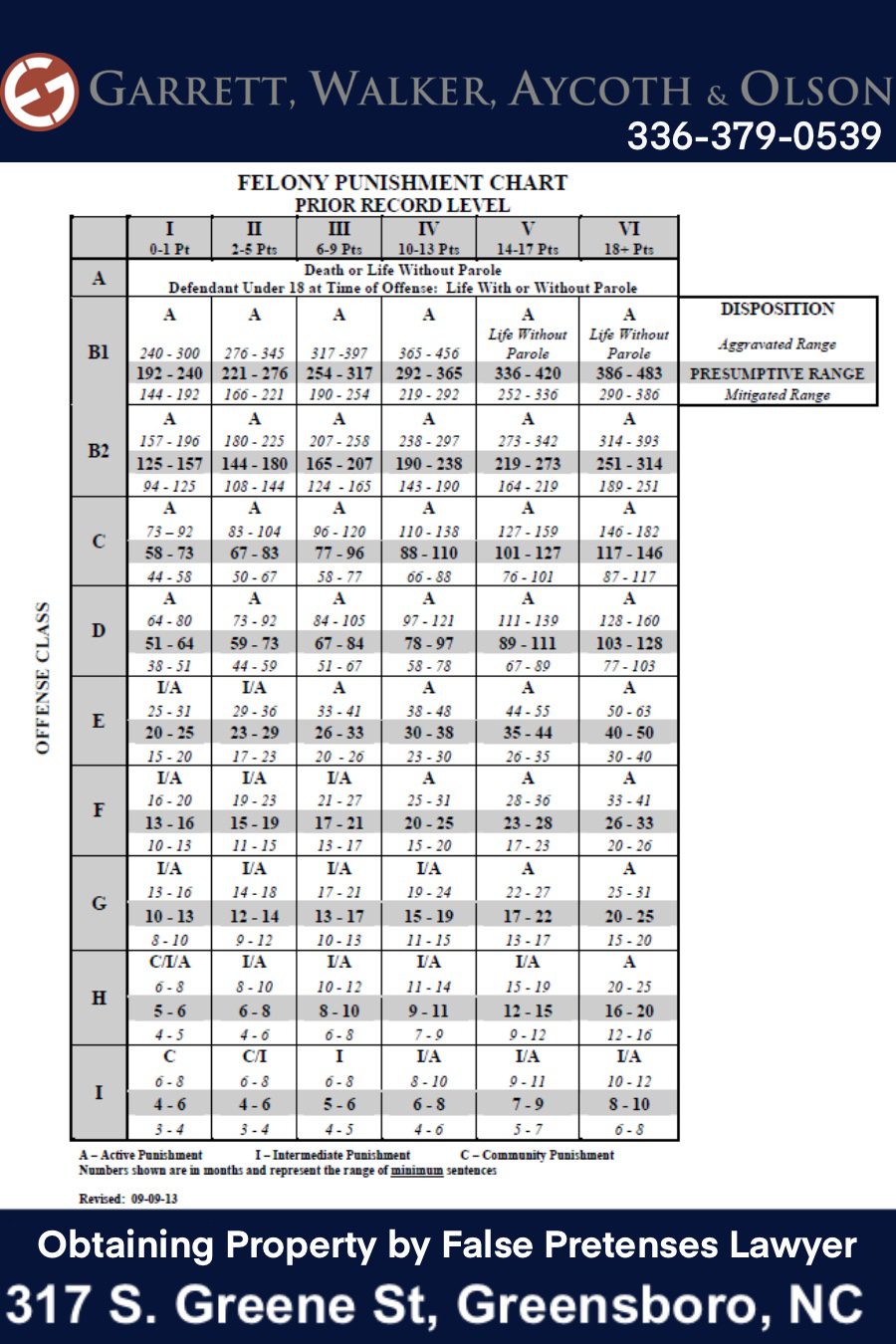Obtaining Property By False Pretenses Lawyer Greensboro, NC
Obtaining Property by False Pretenses is a felony charge in North Carolina because it has multiple levels depending on the amount alleged to have been taken. At Garrett, Walker, Aycoth & Olson, Attorneys at Law, our top rated obtaining property by false pretense lawyers understand the nuances of these cases and we will do everything we can to help you and protect you and your rights. Let’s go over this charge together so you can have a better understanding of how it works and the defenses to protect you.

- What is Obtaining Property by False Pretenses?
- Is Obtaining Property by False Pretense a Felony?
- Can I get Jail Time for Obtaining Property by False Pretenses?
- What are the Elements of Obtaining Property by False Pretenses in North Carolina?
- OBTAINING PROPERTY BY FALSE PRETENSES EXAMPLES
- Obtaining Property by False Pretenses FAQ
- Greensboro Obtaining Property Crime Statistics
- GARRETT, WALKER, AYCOTH & OLSON, ATTORNEYS AT LAW
- Greensboro Obtaining Property by False Pretenses Lawyer Google Review
What is Obtaining Property by False Pretenses?
Obtaining Property by False Pretenses is where one person gets something of value from another after make a false representation to get it. It’s a crime of trickery and fraud – but sometimes a person doesn’t know they’re making a false representation. Maybe they sincerely believed what they represented to other person was true. Our Criminal Lawyers go through all of these common scenarios as we look at Obtaining Property by False Pretenses – let’s get started by answering some common questions.
Is Obtaining Property by False Pretenses a Felony?
Obtaining Property by False Pretenses is a Class H Felony. But if the value of the property taken is above $100,000 or more, it’s a Class C Felony. Felonies in North Carolina start at the highest level which is A and run through the lowest level felony which is a Class I felony. An “A” Felony would be Murder and an “I” Felony would be Felony Possession of Marijuana. So a False Pretense charge is either the second lowest felony as a Class H, or the third highest felony charge as a Class C.

Can I get jail time for Obtaining Property by False Pretenses?
The quick answer is yes, jail time is possible with an Obtaining Property False Pretense case, but that possibility will be dependent on several factors including your prior record level. If you look at the chart above the numbers are all minimums and you match that with your prior record level to determine the box you would be in. There are three letters associated with the Felony Sentencing Chart in North Carolina, C, I & A. C stands for Community Punishment, I for Intermediate (think Probation), and A stands for Active which is being sent to jail or prison.
A Class H Felony begins for a Level I on the left side of the chart in a C,I, A box. Meaning as a first offender you could get Community Service up to Active Time. And then as you work your way across the chart you see that with a higher record level you move into solely Intermediate Punishment which is probation but can also involve a split sentence. A split sentence is when a judge can give you 25% of your max sentence. So if you’re facing a max of 24 months, a judge who gives probation with a split sentence could give you 1/4th of 24 months which is a 6 month split. And if you’re a Level 6 in North Carolina with an Obtaining Property charge you fall into an A box, meaning there’s no option for anything but Active time, unless the prosecutor is willing to reduce the charges you have to I felonies.
If the amount is greater than $100,000 and you are convicted this would be a Class C Felony. If you look at the chart above, every single box is an A box, meaning if you’re convicted of a Class C felony, the only option is for you to serve a jail or prison sentence.
This is why it’s vital to speak with a top rated theft crimes lawyer at Garrett, Walker, Aycoth & Olson, Attorneys at Law. Our law firm is devoted to helping clients with Obtaining Property by False Pretenses cases.
NCGS Obtaining Property by False Pretenses
NCGS 14-100 is the statute that governs Obtaining Property by False Pretenses cases. A lot of the questions we answer here are based on the statute and then the case law that has come about in North Carolina to decide the grey area within the statute. Let’s look at the elements of Obtaining Property together.
What are the elements of Obtaining Property with False Pretenses in North Carolina?
-
- Makes a Representation about:
- A Fact – Past or Existing, OR
- Future Event
- That is False &
- Is Calculated & Intended to Deceive
- That Representation Does In Fact Deceive Another Person, &
- The Person Thereby Obtains, or Attempts to Obtain, Money, Goods, Property, Services, Choses in Action, or Any Other Thing of Value from the Other Person.
- Makes a Representation about:

Obtaining Property by False Pretenses Example
The most common obtaining property case is the classic pawning of an item you don’t own. You obtain property, money in this situation from the pawn shop under the false pretense that you actually own that item. So let’s go through the elements of Obtaining Property by False Pretenses and then we can get a better idea of how it all would work in the Greensboro Courthouse.
EXAMPLE:
Pawned a necklace you don’t own for $500.
- You represented to the pawn shop that you were in fact the owner of the necklace.
- That’s a False Representation because you aren’t the owner.
- You intended to deceive the owner of the pawnshop because you knew it wasn’t yours.
- The pawnbroker was deceived by your false representation that you were the owner of the necklace.
- And you received $500 for the necklace you don’t own.
However, just because the State of North Carolina may be able to see that all of these boxes are checked from their perspective, there are clear ways to defend this case and let’s go through them together:
The ‘Shaggy Defense’ as we call it – It wasn’t me. What if someone used your ID to pawn the item? Our theft lawyers have dealt with this scenario – they had a signature and someone presented your ID, however, when we went back through the video tape (luckily the pawnshop had one) it clearly was not our client.
The main battle in Obtaining Property by False Pretense cases is in the area of Intent to Deceive. Intent to deceive is often inferred from the circumstances surrounding the exchange. However, if they cannot prove you knew the item wasn’t yours or that it was stolen, then they can’t prove an essential element of their case and then you’re not guilty of this crime. This situation is pretty frequent in the court and typically it’s from when a person buys something off the street and then later tries to pawn it. Or someone buys something from someone who got it off the street, and then pawns it.
The other common defense is the pawnbroker would actually need to be deceived, if they know it’s a stolen item then there’s no deception element and you would be found not guilty. And the list of defenses to these charges goes on and on, but before you attempt these waters on your own, we recommend speaking with one of our Top Rated Criminal Lawyers in Greensboro today.
Further Examples of Obtaining Property by False Pretenses:
- Claiming your watch is a Rolex, getting paid the value for a Rolex when it is in fact a “Folex” or fake Rolex for those you back home unaware of what a Fake Roley is.
- False Representation found when person claimed to be a broker, and were given money to buy stocks. State v. Clemmons
- False Representation was found when a person created a fake business to write worthless checks. State v. Bresse
- False Representation found when a person lied about who they were. State v. Tesenair
- Use of Counterfeit Money is a False Representation and same for a worthless check. State v Mitchell & State v. Rogers
- False Invoices and False Statements about someone having an ability to rent their home were also found to be False Representations. State v. Grier & State v. Moore
- A State Employee fixed a person’s home and was paid privately while they were on the clock as a State Employee. They falsified time sheets and were paid by both.
Obtaining Property by False Pretenses FAQ
Does the False Representation Need to be Said or Written for it to be valid?
No, in North Carolina for Obtaining Property by False Pretenses, you can make a false representation by your actions. In State v. Perkins, one person was able to gain merchandise from a store by using their credit card. The use of this credit card or their action, was a false representation that the defendant was authorized and allowed to use the card.
I didn’t know the Item I Pawned was Stolen – is this a Defense to Obtaining Property False Pretenses Cases?
Our criminal lawyers in Greensboro NC often deal with this exact scenario in Obtaining Property Cases. The problem here is when someone is pawning an item they sign paperwork stating they assert that they are in fact the owner and have the legal right to pawn the item in question. Signing those documents when you don’t know you are in fact the legal owner is a problem, because that in-and-of-itself is a False Representation.
In State v. Simpson – the NC Court of Appeals held that there was enough evidence to show that a Pawnshop Owner was deceived by the person charged who claimed to be the owner of cameras he pawned. The pawnshop owner in this case even said he suspected the camears to have been stolen, but he did not know it to be the case and the person asserted the cameras belonged to them. The court found that this was enough to show a False Representation by the Person charged deceived the Shop Owner.
What if I tried to Deceive a Company and not a person?
Unfortunately, in North Carolina, they have decided to go about a very broad definition for what a ‘person’ means. It can be a person, but it also be a corporation, consortium, partnerships or other groups entities or organizations.
Also, important to note is this concept of an agent working for a corporation. Both the corporation and the agent can be charged if the court finds that the person was acting on the corporations behalf and the corporation was the group the property was obtained for.
Does the Person I defrauded need to be the Person I made the false representation to?
No they do not, and let go through an example to explain. Suppose we’re dealing with three people.
- Person A – needs some money
- Person B – friend of Person B, who doesn’t have money
- Person C – friend of Person B who has the money and doesn’t have any contact with Person A.
If Person A lied to Person B to get Person C to give Person A some money, Person A can still be charged with Obtaining Property by False Pretenses though he never had any contact with Person C, who lost their money as a result of the false representations by Person A.
What if I Intended to Pay the Person Back?
It does not matter in North Carolina for Felony Obtaining Property by False Pretenses charges that you always intended to pay the person back. It’s just a matter of whether you deceived the person to get what you wanted. Intent to compensation or pay back the person is not an element or factor when it comes to the State of North Carolina proving you intended to deceive the person.
That being said, even if you pay the money back it does not mean that the crime didn’t happen. It’s important to note that Obtaining Property by False Pretenses is charged and prosecuted because of the act, not because of your ability to make the person whole.
CAUSATION
There must be a relationship between the false representation and the person acquiring the property. This is termed Causation. The false representation needs to have some causal relationship with the property they intended to acquire.
If a person made a False Representation for some reason other than to get property from another person, corporation – THIS CRIME HAS NOT OCCURRED.
The false representation needs to be to obtain the property for obtaining property by false pretenses.
Greensboro Obtaining Property Crime Statistics
2023 is just getting started at the time of this article, and according to Weekly Crime Data that Greensboro Police department releases every week; Obtaining Property and related crimes are down in Greensboro, NC in 2023. The chart below gives a breakdown of current statistics
| Theft Crimes North Carolina 2023 |
Larceny Crimes
114 |
Shoplifting
153 |
Motor Vehicle Theft
70 |
Stolen Property
27 |
Theft From Vehicle
125 |
|---|
GARRETT, WALKER, AYCOTH & OLSON, ATTORNEYS AT LAW
317 S. GREENE ST, GREENSBORO, NC 27401
Obtaining Property by False Pretenses is nothing to play around with on your own. The Top rated Criminal Lawyers in Greensboro at Garrett, Walker, Aycoth & Olson, Attorneys at Law are prepared to help you with your case, call them today!
Call us at (336) 379-0539 to schedule a free, in-depth consultation with our experienced lawyers.
Greensboro Obtaining Property by False Pretenses Lawyer Reviews:
Client Review
“These guys did a great job handling my case and getting me the outcome I hoped for. I worked with Jason, and he was very good about walking me through what to expect and maintained great communication throughout the whole case. Anytime I had a question he answered, and even after the case was finished he followed up to make sure i understood everything. He even walked me through the options I had as far as getting my record expunged or not. Again great people to work with, and I would highly recommend consulting with them for any legal troubles you might need handled.” September 12, 2022
5/5 Stars


